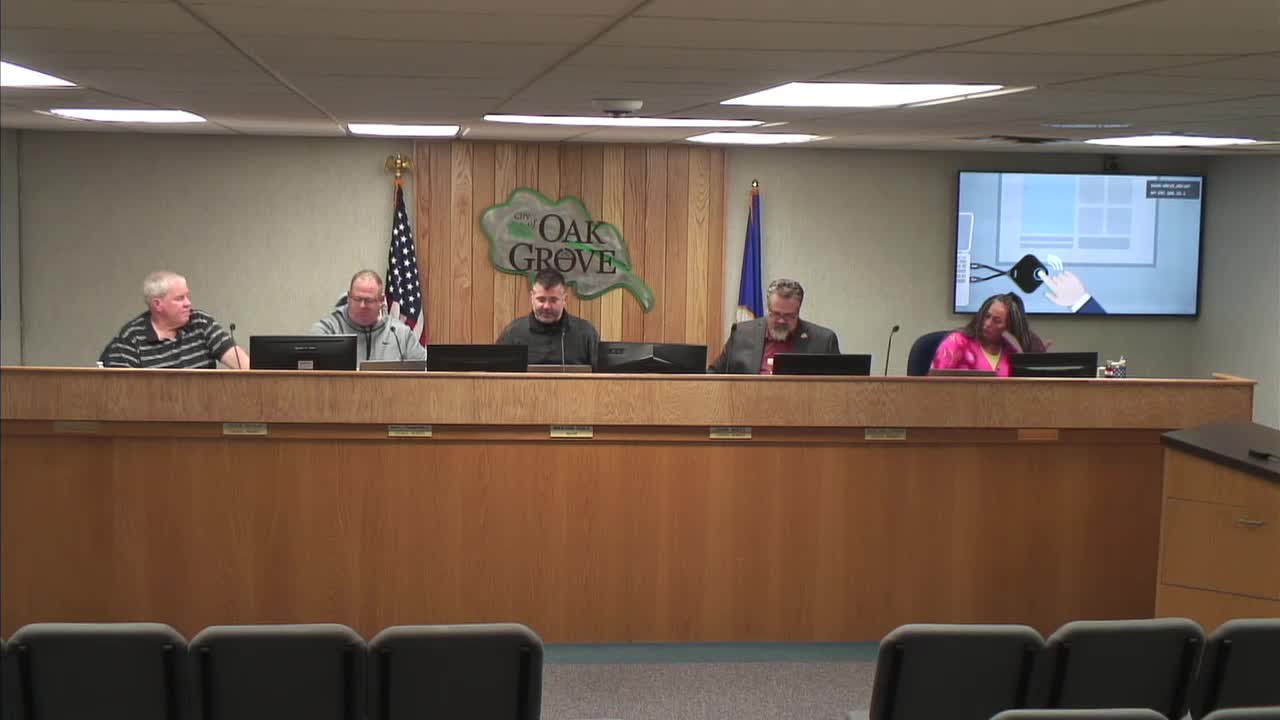Oak Grove council reviews administrative citation option to speed code enforcement
Get AI-powered insights, summaries, and transcripts
Subscribe
Summary
Consultants for Oak Grove reviewed a proposed administrative-citation program intended to speed compliance, reduce reliance on the courts and lower legal costs; council members asked for clearer reporting on existing cases and asked staff to review model ordinance language with counsel.
Rum River Consulting presented an administrative-citation model to Oak Grove City Council members during a Jan. 27 work session, saying the noncriminal approach could speed compliance for property-code violations and reduce reliance on the city attorney and district courts.
Carissa [last name not specified], community development lead for Rum River Consulting, told council members the firm seeks to maintain “safety, health and quality of life throughout the community” by creating clearer enforcement steps that encourage voluntary compliance and, when necessary, levy administrative fines rather than pursue criminal misdemeanor charges. “Administrative citations are a noncriminal penalty,” Carissa said. “They are typically faster and they are definitely more flexible than court proceedings.”
Carissa and Andy Schroeder of Rum River described the city’s current workflow: staff forwards complaints to Rum River, which verifies violations, issues a 30‑day warning and follows up. If voluntary compliance fails, cases go to the city attorney for civil or criminal action. Carissa said Rum River began administering Oak Grove’s program in June 2023 and has handled 162 total cases to date — 33 that existed before Rum River’s involvement and 129 new cases since June 2023 — of which 98 were resolved and 38 remain open.
Carissa said criminal prosecution is often slow and expensive and does not always resolve the underlying violation. “For a typical timeline for a criminal citation, we’re looking at one to three years,” she said, and noted that state statutes allow misdemeanors to carry up to $1,000 in fines and up to 90 days in jail. She urged council members to consider an administrative citation ordinance and provided model ordinance language in the meeting packet for council review.
The consultants outlined sample administrative fine ranges that are commonly used by other jurisdictions and included recommendations in the packet: animals $100 per day; septic violations $100 per day; open burning $200 per day; grass, trees and weeds $100 per day; nuisances and certain building/stormwater violations $200 per day; noise $100 per day. Carissa said daily fines compound and typical maximum exposure in the models is in the $2,000–$3,000 range, with options to stay or negotiate fines if a property comes into compliance.
Council member Trudewell expressed concern about harsh outcomes for inadvertent or short-term lapses, saying, “I don’t wanna become that kind of a city where… somebody forgets to mow their grass or is on vacation for two weeks and gets a ticket for $100 per day.” Carissa responded that Rum River’s practice prioritizes education and communication and that many cases are resolved without fines: “If they would have gotten to that stage with compliance, we could have worked with staying the fine,” she said.
Council members also asked for more transparent reporting on outstanding cases. One council member noted that many complaints are long-running and said they receive constituent calls asking for status updates. Council members directed staff to provide more regular status reporting on major code cases and to discuss the model ordinances with the city attorney. At the end of the session council members agreed to continue the conversation after the regular council meeting and to give City Administrator Lauren Wickham direction on next steps.
Rum River also described administrative-process safeguards in the model: a warning period (commonly two weeks to 30 days depending on the violation), an ability for property owners to contest citations before a third‑party administrative hearing officer, and the capacity to negotiate stays or compliance plans. Carissa said administrative citations often open lines of communication with property owners, which the consultants view as a benefit versus relying on the court system.
No ordinance was adopted at the session. Council members asked staff to review the model ordinance with counsel, return with recommended language if warranted, and provide more frequent updates on major and outstanding cases.
